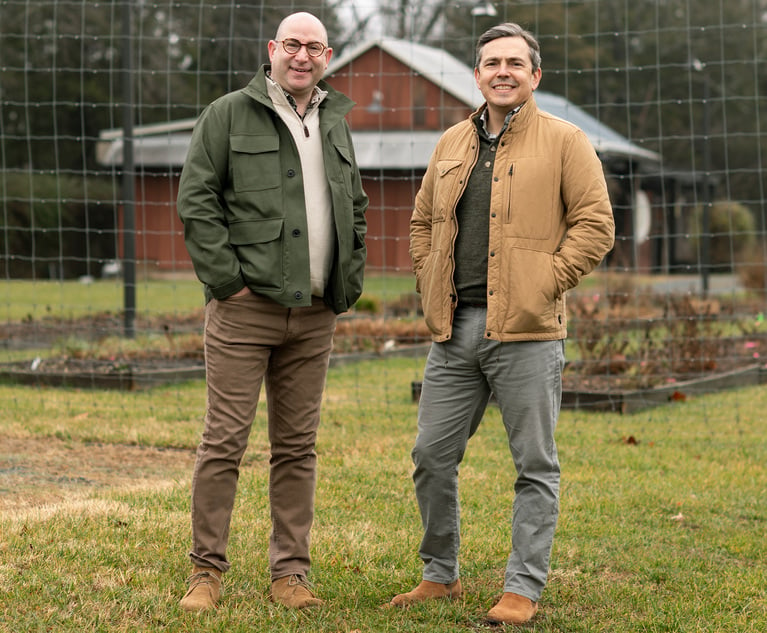 Credit: jiris/Adobe Stock
Credit: jiris/Adobe Stock Litigator of the Week Runners-Up and Shout-Outs
Lawyers at McKool Smith and Keller Postman helped the Office of the Attorney General of Texas secure a $1.4 billion settlement with Meta Platforms Inc. on claims brought under the state's biometric privacy law.
August 02, 2024 at 07:25 AM
7 minute read
First up this week are lawyers at McKool Smith and Keller Postman, who helped the Office of the Attorney General of Texas secure a $1.4 billion settlement with Meta Platforms Inc. on claims brought under the state's Capture or Use of Biometric Identifier Act of 2009. The biometric privacy law carries penalties of up to $25,000 per violation for companies that take the biometric identifiers of Texans for a commercial purpose without their informed consent. The state claimed Facebook's abandoned "tag suggestions" feature captured the facial geometry of users and non-users alike. The company previously agreed to pay $650 million in 2020 to settle a class action brought under a similar Illinois biometric privacy law targeting the feature. Zina Bash of Keller Postman and Sam Baxter and Jennifer Truelove of McKool Smith served as lead counsel. The McKool Smith team also included principals John Briody, Kevin Burgess, Charles Fowler, Rick Halper, Eric Hansen, Lew LeClair, Radu Lelutiu and Robert Manley and associates Asena Baran, Caroline Burks, Michael Catapano, Joseph Micheli, Taylor Perez, Carra Rentie and Lauren Simenauer. The Keller Postman team included Nick Larry, Jessica Beringer, Ashley Keller, J.J. Snidow, Alex Dravillas, Kiran Bhat, Zach Clark, Rosie Romano, Branden Weber, Andray Napolez and Randall Newman, as well as legal support staff led by Marla Bernal.
NOT FOR REPRINT
© 2024 ALM Global, LLC, All Rights Reserved. Request academic re-use from www.copyright.com. All other uses, submit a request to [email protected]. For more information visit Asset & Logo Licensing.
You Might Like
View All
Litigators of the Week: After a 74-Day Trial, Shook Fends Off Claims From Artist’s Heirs Against UMB Bank

An ‘Indiana Jones Moment’: Mayer Brown’s John Nadolenco and Kelly Kramer on the 10-Year Legal Saga of the Bahia Emerald

Why the Founders of IP Boutique Fisch Sigler Are Stepping Away From the Law and Starting an AI Venture
Law Firms Mentioned
Trending Stories
- 1Senate Judiciary Dems Release Report on Supreme Court Ethics
- 2Senate Confirms Last 2 of Biden's California Judicial Nominees
- 3Morrison & Foerster Doles Out Year-End and Special Bonuses, Raises Base Compensation for Associates
- 4Tom Girardi to Surrender to Federal Authorities on Jan. 7
- 5Husch Blackwell, Foley Among Law Firms Opening Southeast Offices This Year
Who Got The Work
Michael G. Bongiorno, Andrew Scott Dulberg and Elizabeth E. Driscoll from Wilmer Cutler Pickering Hale and Dorr have stepped in to represent Symbotic Inc., an A.I.-enabled technology platform that focuses on increasing supply chain efficiency, and other defendants in a pending shareholder derivative lawsuit. The case, filed Oct. 2 in Massachusetts District Court by the Brown Law Firm on behalf of Stephen Austen, accuses certain officers and directors of misleading investors in regard to Symbotic's potential for margin growth by failing to disclose that the company was not equipped to timely deploy its systems or manage expenses through project delays. The case, assigned to U.S. District Judge Nathaniel M. Gorton, is 1:24-cv-12522, Austen v. Cohen et al.
Who Got The Work
Edmund Polubinski and Marie Killmond of Davis Polk & Wardwell have entered appearances for data platform software development company MongoDB and other defendants in a pending shareholder derivative lawsuit. The action, filed Oct. 7 in New York Southern District Court by the Brown Law Firm, accuses the company's directors and/or officers of falsely expressing confidence in the company’s restructuring of its sales incentive plan and downplaying the severity of decreases in its upfront commitments. The case is 1:24-cv-07594, Roy v. Ittycheria et al.
Who Got The Work
Amy O. Bruchs and Kurt F. Ellison of Michael Best & Friedrich have entered appearances for Epic Systems Corp. in a pending employment discrimination lawsuit. The suit was filed Sept. 7 in Wisconsin Western District Court by Levine Eisberner LLC and Siri & Glimstad on behalf of a project manager who claims that he was wrongfully terminated after applying for a religious exemption to the defendant's COVID-19 vaccine mandate. The case, assigned to U.S. Magistrate Judge Anita Marie Boor, is 3:24-cv-00630, Secker, Nathan v. Epic Systems Corporation.
Who Got The Work
David X. Sullivan, Thomas J. Finn and Gregory A. Hall from McCarter & English have entered appearances for Sunrun Installation Services in a pending civil rights lawsuit. The complaint was filed Sept. 4 in Connecticut District Court by attorney Robert M. Berke on behalf of former employee George Edward Steins, who was arrested and charged with employing an unregistered home improvement salesperson. The complaint alleges that had Sunrun informed the Connecticut Department of Consumer Protection that the plaintiff's employment had ended in 2017 and that he no longer held Sunrun's home improvement contractor license, he would not have been hit with charges, which were dismissed in May 2024. The case, assigned to U.S. District Judge Jeffrey A. Meyer, is 3:24-cv-01423, Steins v. Sunrun, Inc. et al.
Who Got The Work
Greenberg Traurig shareholder Joshua L. Raskin has entered an appearance for boohoo.com UK Ltd. in a pending patent infringement lawsuit. The suit, filed Sept. 3 in Texas Eastern District Court by Rozier Hardt McDonough on behalf of Alto Dynamics, asserts five patents related to an online shopping platform. The case, assigned to U.S. District Judge Rodney Gilstrap, is 2:24-cv-00719, Alto Dynamics, LLC v. boohoo.com UK Limited.
Featured Firms
Law Offices of Gary Martin Hays & Associates, P.C.
(470) 294-1674
Law Offices of Mark E. Salomone
(857) 444-6468
Smith & Hassler
(713) 739-1250







